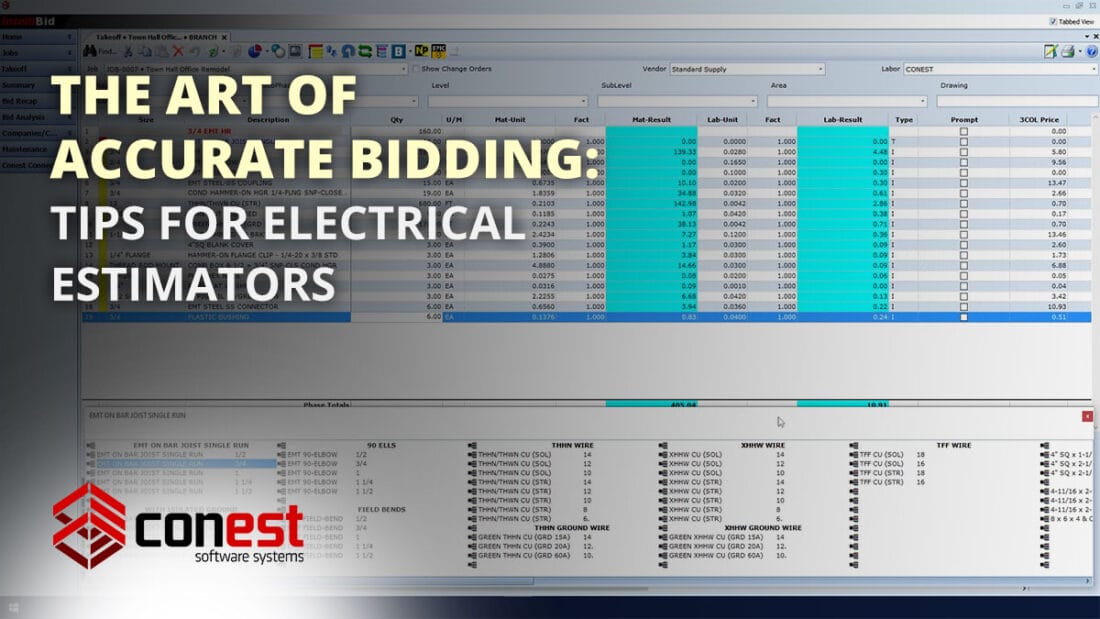The Art of Accurate Bidding: Tips for Electrical Estimators
Accurate bidding is an essential skill for electrical estimators. It’s the fine balance between being competitive and ensuring profitability. In the electrical contracting industry, where project scopes and client expectations vary widely, mastering the art of bidding can set you apart. These tips offer practical advice for electrical estimators that are seeking to enhance their bidding accuracy.
Understanding Project Requirements Thoroughly
Comprehensive Project Analysis
Begin by thoroughly analyzing the project specifications. Understanding every aspect of the project, from the electrical systems needed to the labor requirements, is crucial. This detailed analysis helps in identifying potential challenges and special requirements early on.
Client Consultation
Engage in meaningful conversations with clients to understand their needs and expectations fully. This not only helps in tailoring your bid but also establishes trust and lays the groundwork for a successful project.
Leveraging Technology in Estimation
Utilizing Estimation Software
Invest in reliable estimation software. Tools made specifically for electrical estimation, like Conest IntelliBid, can streamline the estimation process, reduce human error, and save time. These tools also keep historical data, which can be invaluable for future projects.
Embracing Digital Blueprints
Digital blueprints and Building Information Modeling (BIM) can provide a more accurate view of the project’s requirements. They allow you to visualize the project in 3D, making it easier to estimate materials and labor more accurately.
Accurate Material and Labor Cost Estimation
Up-to-Date Price Lists
Ensure that you have the latest prices for materials. Prices can fluctuate, and using outdated information can significantly impact the accuracy of your bid.
Realistic Labor Cost Assessment
Assess labor costs realistically. Consider the skill levels required, the complexity of the work, and the project’s duration. Factor in potential overtime, holidays, and any other labor-related costs.
Contingency Planning
Including Contingencies
Include a contingency in your bid to cover unforeseen expenses. Typically, a contingency of 5-10% is reasonable, but this can vary depending on the project’s complexity and risk level.
Considering Overheads and Profit Margins
Overhead Costs
Factor in overhead costs such as office expenses, insurance, and vehicle costs. These are often overlooked but crucial for ensuring your bid covers all expenses.
Setting Profit Margins
Determine a fair profit margin. While competitive pricing is important, your bid must also ensure the financial viability of your business.
Risk Assessment and Management
Identifying Potential Risks
Identify potential risks in the project, such as supply chain issues or challenging installation environments. Assessing risks early on helps in creating a more accurate bid.
Risk Mitigation Strategies
Develop strategies to mitigate identified risks. This could include alternative sourcing for materials or allocating extra time for complex installation phases.
Regular Review and Adaptation
Post-Project Analysis
After completing a project, analyze your estimation accuracy. Identify areas where actual costs differed from your estimates and understand why. This learning helps in improving future bids.
Staying Informed
Stay informed about industry trends, new technologies, and market fluctuations. Continuous learning is essential in an ever-evolving industry.
Conclusion
Accurate bidding is a skill honed through experience, attention to detail, and a deep understanding of the electrical contracting industry. By thoroughly understanding project requirements, leveraging technology, accurately estimating costs, planning for contingencies, and continuously adapting and learning, electrical estimators can master the art of accurate bidding. Remember, a successful bid is not just about winning the project; it’s about laying the foundation for a profitable and well-executed project.


